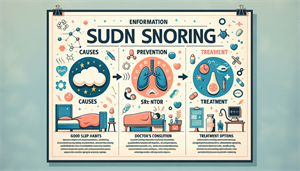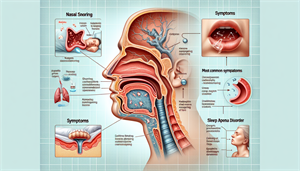
Why Am I Snoring All of a Sudden?
Have you ever wondered, “why am I snoring all of a sudden?” Snoring can be a puzzle, especially when it appears out of the blue. But don’t worry, every mystery has its solution, and you’re about to embark on a journey to uncover yours.
Factors Causing Sudden Snoring
Factors causing sudden snoring include lifestyle changes like weight gain, increased alcohol consumption, anatomical issues, sleeping position, and nasal conditions like allergies or a cold. Snoring might indicate a more serious health issue like obstructive sleep apnea (OSA), which is linked to cardiovascular concerns such as high blood pressure, heart disease, and stroke. Preventative measures against snoring include lifestyle adjustments, using anti-snoring devices, and in more severe cases, medical interventions like CPAP devices or surgery.
The Sudden Onset of Snoring: Uncovering the Causes
When it comes to the sudden onset of snoring, several factors might come into play. Some common causes of sudden snoring include lifestyle shifts, such as weight gain and alcohol consumption, which can lead to the relaxation of muscles in the throat, anatomical factors like enlarged tonsils, and nasal issues such as allergies or a cold. These factors can contribute to snoring and may be the common causes of snoring for those who start snoring suddenly.
Lifestyle Shifts and Their Impact on Sleep
Carrying extra weight, especially around the neck, heightens the risk of snoring. Dental sleep medicine professionals can help identify and treat snoring and sleep apnea by providing custom-fitted oral appliances that can help maintain an open airway during sleep. Consuming alcohol is another lifestyle choice that can induce snoring. Alcohol can excessively relax the muscles in the tongue and throat, leading to snoring. To minimize snoring, it is advised to abstain from alcohol three to four hours before bedtime.
Navigating Nasal Challenges
Snoring can result from nasal congestion or any other condition that obstructs normal nasal breathing, such as a blocked nose. One potential solution for addressing nasal congestion related to snoring is to consider using over-the-counter medicines or nasal strips, as they can help open up airways and reduce snoring associated with nasal issues. Exposure to allergens and irritants can result in nasal congestion, sinus inflammation, and airway damage, potentially leading to snoring.
The Influence of Sleep Position
Sleeping on your back may result in snoring since gravity can pull the soft tissue, like the tongue, into the airways, which may block them. To alleviate snoring, one can opt to sleep on their side, as it can decrease the intensity and duration of snoring, or choose to sleep on their back with the head elevated using stacked pillows or an adjustable bed to maintain open airways.
When Snoring Signals a Health Concern
Although snoring might appear to be just a simple annoyance, it can occasionally signify a more severe underlying health issue. Obstructive sleep apnea (OSA) is a notable sleep disorder commonly linked with snoring. It arises when a person’s airway becomes partially or fully obstructed during sleep, leading to interruptions in breathing. Sleep apnea is not only disruptive to a good night’s sleep but can also have significant health implications.


